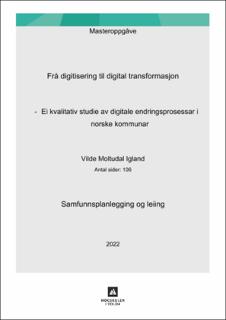| dc.contributor.advisor | Stokken, Roar | |
| dc.contributor.author | Igland, Vilde Moltudal | |
| dc.coverage.spatial | Norway | en_US |
| dc.date.accessioned | 2023-02-17T10:09:48Z | |
| dc.date.available | 2023-02-17T10:09:48Z | |
| dc.date.issued | 2022 | |
| dc.identifier.uri | https://hdl.handle.net/11250/3051882 | |
| dc.description.abstract | Bakgrunnen for dette prosjektet er å forstå meir om korleis norske kommunar møter nasjonale styringsdokument og forventningar om auka digitalisering, bruk av kunstig intelligens og digital transformasjon, for å klare å halde oppe velferdsnivået og konkurransekrafta i åra som kjem. For å skape kunnskap om dette temaet, tek prosjektet utgangspunkt i problemstillinga: «Korleis kan vi forstå kommunane si tilnærming til digitalisering og digital teknologi?»
Med utgangspunkt i problemstillinga vert kommunane sine tilnærmingar til bruken av digital teknologi skildra, analysert og drøfta i dette prosjektet. Problemstillinga vert vidare utdjupa av to forskingsspørsmål, som dreg linjene mellom politiske føringar og praktisk utføring. Slik at også dei kontekstuelle, strategiske og operasjonelle forholda vert tilstrekkeleg fanga opp av prosjektet.
Det teoretiske rammeverket tek utgangspunkt i endringsteorien, knytt til organisasjon-og leiingsteorien. Her vert mellom anna digitaliseringsomgrepet - frå digitisering til digital transformasjon utbrodert. Andre nøkkelelement frå teorien er både sosio-teknisk teori og Schein sin “Lewininan model for change and learning”. Sistnemnde er brukt for å sjå nærare på endringsleiinga i praksis.
Problemstillinga med tilhøyrande forskingspørsmål inviterar til å utforske tankar, idear, haldningar og erfaringar kring tematikken, og følgjer dermed ein kvalitativ tradisjon der datamaterialet vert samla inn og analysert gjennom tekst og skildringar. I metoden vert det veksla mellom teoristyrt- og empiristyrt metodikk, som vert skildra som deduktiv induktiv framgangsmåte eller SDI-metoden. Dei empiriska data i undersøkinga vert generert gjennom semsistruktukturerte forskingsintervju, og den hermeneutiske sirkelen vert brukt som reiskap for å forstå og tolke datamaterialet.
Dei viktigaste funna i prosjektet peikar på at kommunane organiserar seg ulikt som ein respons på at dei digitale endringsprosessane er prega av usikkerheit, smalt politisk handlingsrom, tronge økonomiske rammer og manglande nasjonal koordinering. I tillegg opplever dei usikkerheit knytt til både prosesshandtering av digitaliseringa og digital transformasjon, og til korleis gå fram for å utnytte moglegheitsrommet som vert beskrive både av nasjonale strategiar og i teorien elles. Dette fører til ein teknologisk determinisme, der teknologien styrer mykje av utviklinga som skjer. | nn_NO |
| dc.description.abstract | Abstract
The intention of this project is to better understand how Norwegian local governments (municipalities) interact with national frameworks and expectations of increased digitalization, use of artificial intelligence and digital transformation, to maintain welfare and competitiveness in the coming years. In order to establish knowledge about this topic, the project is based on the thesis question: “How can we understand local governments’ approach to digitalization and digital technology?”
The thesis question forms the basis for how this project describes, analyses, and discusses local governments’ approach to the use of digital technology. The thesis question is further expanded into two research questions that draw comparisons between political guidelines and practical execution. In this way, the contextual, strategic, and operational circumstances are sufficiently addressed by the project.
The theoretical framework is based on the change theory, related to organizational leadership theory. This explores the notion of digitalization – from digitization to digital transformation. Other key elements from the theory are both socio-technical theory and Schein’s “Lewinian Model of Change/Learning”. The latter is used to further explore the practical side of change management.
The thesis question with its accompanying research questions invites you to explore thoughts, ideas, attitudes, and experiences surrounding the theme, and therefore follows a qualitative tradition in which the data material is collected and analysed through text and descriptions. The method alternates between theory driven and empirically driven methodology, described as the deductive-inductive method or SDI-method. The empirical data from the research was generated using semi-structured research interviews, and the hermeneutic circle was used as a tool to understand and interpret the material.
The most important findings in the project points to local governments organising differently as a reaction to digital processes of change being characterised by uncertainty, narrow political latitude, small financial openings, and a lack of national coordination. In addition, they experience uncertainty related to processes connected to digitalization and digital transformation, and to the best course of action to utilise the scope of possibility described by both national strategies and elsewhere in theories. This leads to a technological determinism, where technology determines much of innovation. | en_US |
| dc.language.iso | nno | en_US |
| dc.publisher | Høgskulen i Volda | en_US |
| dc.title | Ei kvalitativ studie av digitale endringsprosessar i norske kommunar | en_US |
| dc.title.alternative | Digitale endringsprosessar i offentleg sektor | en_US |
| dc.type | Master thesis | en_US |
| dc.rights.holder | Forfattaren | en_US |
| dc.source.pagenumber | 106 | en_US |
| dc.description.localcode | IPA 309 | en_US |
